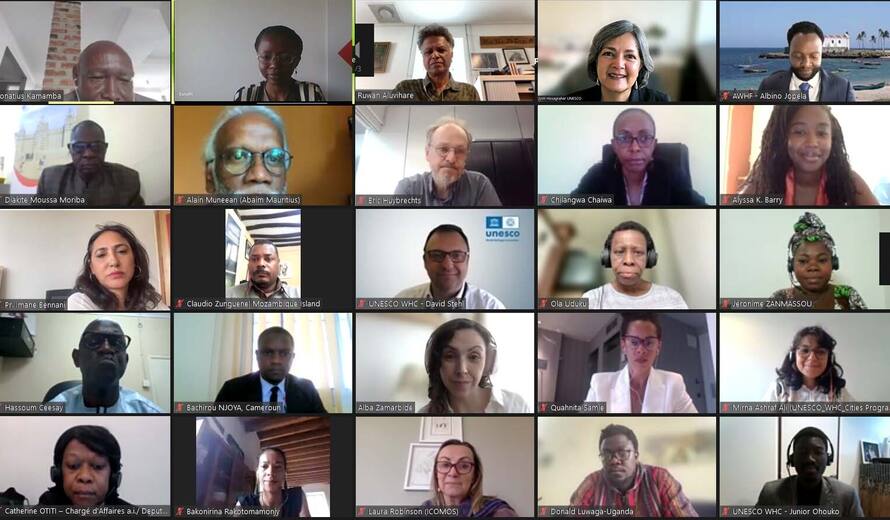Workshop on Re-discovering African heritage through the lense of the 2011 Recommendation on the Historic Urban Landscape
On 24 July 2023, the UNESCO World Heritage Centre in partnership with the African World Heritage Fund (AWHF) and ICCROM, held an online workshop dedicated to “Re-discovering African urban heritage through the lenses of the 2011 Recommendation on the Historic Urban Landscape” (HUL). Thanks to the generous support of the Government of Norway, the workshops recorded the participation of over 100 African experts and professionals who shared their experiences in a participatory environment.
The activity revolved around the pilot project conducted at the UNESCO World Heritage property “Tombs of Buganda Kings at Kasubi” Uganda, to develop guidelines for its buffer zone in line with the HUL Recommendation. As part of the opening remarks shared by the Deputy Director of UNESCO World Heritage , Ms Jyoti Hosagrahar expressed that,
“The case of Kasubi is not unique in Africa. Many heritage sites face similar challenges of management in the context of rapid transformation or unplanned urban development. For that, we hope that the Kasubi project will be the first of a series of many”
The approach taken by the project is especially relevant in Africa, as HUL does not deny development, but rather makes sure that it is realized in a way that respects history, culture, heritage, and local assets thus contributing to sustainable development. The main goal of the workshop was to understand the interest and replicability of the project in other African cities facing similar problems. Local city contexts and required priority actions were also widely discussed.
The initiative started with an online workshop in December 2022 during which participants identified heritage attributes and related challenges beyond the current boundaries of the Tombs of Buganda Kings at Kasubi, the World Heritage site. A mapping of these followed. In May 2023, a UNESCO expert mission was undertaken, and a series of activities focused on the on-site analysis of the targeted areas and discussions on priority actions at different scales. All these stages have been conducted in a collaborative manner including diverse local stakeholders (Buganda Kingdom, Ministry of Tourism, Kampala City Planning Institute, universities, and local communities, among others).
Site Managers of different African cities such as the Old Towns of Djenné, the Historic Town of Grand-Bassam, Koutammakou, the Land of the Batammariba, Lamu Old Town, Aapravasi Ghat showed their interest in the pilot project at Kasubi. Many of them shared the same challenges such as sewage, invasive constructions, height limits and new constructions, fire protection, etc. They also insisted on the use of reference examples and projects from other cities on how to cope with rapid transformation while safeguarding the Outstanding Universal Values (OUV). The Guidelines of this pilot project are in the final stages of finalization after which, a local implementation phase should follow. The team of heritage and urban experts, involved throughout the project, structured these ideas in the shape of Ambitions, Guidelines and Recommendations.
A number of cities are facing similar economic and development pressures that need to be regulated while at the same time allowing infrastructure development. Several voices also addressed the potential of digital tools, engagement of universities and heritage education. Mr Muhammad Juma, Head of the Africa Unit of the UNESCO World Heritage Centre, closed the session by announcing future pilots and the wish to explore how the HUL Recommendation could be used in other African cities.

